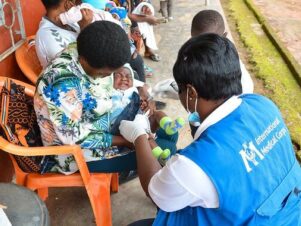A virus that reducing your ability to fight infections, damages the cells of your immune system and exposes you to everyday illnesses is called human Immunodeficiency Virus (HIV). In this article we are going to be discussing about the HIV virus and our experiences with our patients at bigmanlab.
A series of life-threatening diseases and infections that appear when the immune system is seriously damaged by the HIV virus is referred to as AIDS (Acquired Immune Deficiency Syndrome). The majority of people living with HIV will not develop AIDS-related illnesses if given early diagnosis and take effective treatment, and will have a near-normal life expectancy.
What about is HIV?
Human Immunodeficiency Virus (HIV) is a virus that makes an individual more susceptible to other diseases and infections by attacking cells that help the body fight infection. It is transmitted through certain body fluids contact from an HIV-infected person, most often during sex without condom (unprotected sex or HIV medications to treat or prevent HIV) or by sharing injection equipment.
What about AIDS?
The final stage of an HIV which occurs when the virus seriously damages the immune system of the body. In Africa, most people develop AIDS from HIV due to no HIV drugs that prevents the disease from progressing.
HIV is thought to have developed to AIDS if:
- The CD4 counts dropped to less than 200 cells/mm3 (200 cells per cubic millimeter of blood). The CD4 count ranges from 500 to 1600 cells/mm3 in a person with a healthy immune system.)
- Regardlesss of the CD4 count, one or more opportunistic infections develop.
People with AIDS without HIV treatment, usually live about 3 years. Life expectancy drops to about 1 year without treatment once a person has a life-threatening opportunistic disease. At this stage of HIV infection, HIV medicines can still help and even save lives.
Getting tested for HIV is very important because people who start HIV treatment soon after becoming experiencing HIV reap the greatest benefits.
Who is at risk of becoming infected with HIV?
Some groups are more at risk even though anyone can get HIV. These groups include:
- People having other STIs (sexually transmitted infections). Having other sexually transmitted infection can increase your risk of spreading or getting HIV.
- People who share needles used to inject drugs.
- Bisexuall men and gay.
- Africans. They represent the highest proportion of people living with HIV and newly diagnosed HIV cases compared to other countries.
- People having unprotected sex in (do not use condoms).
In Cameroon some factors such as geographic region, education, income, discrimination, and stigma can equally influence a person's risk of having HIV.
What about HIV Symptom?
Depending on the stage of the infection, the AIDS or HIV symptoms vary.
Acute HIV (Primary infection):
Within 2-4 weeks after HIV enters the body, some HIV infected people develop a flu. This illness, can last for several weeks.
HIV symptoms and signs and that may occur include:
- Joint pains and muscle aches
- Fever
- Swollen lymph nodes, especially in the neck
- Headache
- Rashes
- Painful mouth sores and sore throat
- Diarrhea
- Coughs
- Weight loss
- Night sweats
These symptoms may be quite mild in such a way that you may not be aware of them. The quantity of HIV virus in your blood (also known as viral load) is quite large here. The HIV infection spreads lesser as a result, during the next stages compared to primary infection stage.
What about stages of HIV?
If people living with HIV do not receive treatment, they generally go through three major stages. However HIV treatment can prevent or slow the disease progression. Progression to AIDS (stage 3) is less common today with advances in HIV treatment than it was in the past.
Acute HIV infection: Stage 1
- Infected people are highly contagious and have high amounts of HIV in their blood stream.
- Several people with symptoms of a flu.
- Get tested when you think you may have been exposed to HIV and have flu-like symptoms.
Chronic infection: Stage 2
- This stage is also known as clinical latency or asymptomatic HIV infection.
- HIV keeps multiplying and is still active in the body.
- At this stage people may have be sick or no symptoms, but they can still transmit HIV.
- People who receive HIV treatment as prescribed may never progress to stage 3 (AIDS).
This stage can last a decade or more without HIV treatment or even progress more rapidly. The amount of HIV in the blood (viral load) increases after this stage ends and the infected person can progress to AIDS (stage 3).
AIDS (Acquired Immune Deficiency Syndrome): Stage 3
- The most serious stage of HIV infection.
- People with AIDS can easily transmit HIV to other people and have a high viral load.
- People with HIV/AIDS have severely damaged immune systems. They may become more susceptible to serious illnesses or opportunistic infections.
- People with AIDS taking no HIV treatment typically live for about three years.
What about HIV causes
HIV is located in an infected person’s body fluid. This includes breast milk, semen, and blood, anal and vaginal fluids. HIV is does not last long outside the body as it is a fragile virus. HIV can’t be spread through saliva sweat, or urine. In Cameroon the most common way to contract HIV is through unprotected vaginal or anal sex.
More ways to get HIV are:
- Sharing syringes, needles or other injection equipment
- Mother-to-child transmission during lactation, pregnancy, or childbirth
The chance of contracting HIV via oral sex is quite low and depends on several things, such as: whether oral sex is received or performed, and also on the oral hygiene of the person having oral sex.
What about HIV/AIDs treatment?
HIV infection can be treated with medication but cannot be cured. Also known as ART (antiretroviral therapy). HIV infection can be turned into manageable chronic disease with antiretroviral therapy. This equally reduces the risk of transmitting the virus to others.
Receiving and staying on antiretroviral therapy helps most people living with HIV to live healthy and long lives. It is equally essential to take care of your health. By making sure you get regular medical care, a healthy lifestyle, and the support you need, you can live a quality life.
What about HIV prevention
Anyone who shares needles or has unprotected sex are at risk of contracting HIV. There’re several effective ways to reduce or prevent the risk of HIV infection, including:
- If you use never share needles, antiretroviral therapy drugs, or other injection equipment, including swabs, spoons, and needles.
- Use condoms when you have sex
- PrEP (Pre-exposure prophylaxis)
- PEP (Post Exposure Prophylaxis)
- HIV treatment to reduce viral load to undetectable levels
Message from bigmanlab:
Contact us at bigmanlab@gmail.com for more advice on the best way to reduce HIV risk. If you’re living with HIV, have taken effective treatment for HIV, and your viral load has been undetectable for 6 months or even more this means that you cannot transmit the virus through sexual intercourse.







